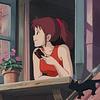Take a photo of a barcode or cover
This book is necessary reading, and I am not exaggerating saying this. As a person who did not learn nearly enough about Asian American history in high school and prior, this book was so eye opening to read.
Now, moving on to some of the additional reasons why this book struck a literary chord within me. Firstly, the prose in this novel is stunning. It contains such a lyrical writing style, but also writing about harsh and honest emotions that the characters feel.
Another aspect of Han Kang’s writing in this book that scratches an itch in my noggin is that the words not only read like poetry, but they feel so immersive as well, like I am a bystander watching the characters lives pan out from a far distance. The details described within this book in general are so visceral.
Overall, this book depicts the themes of being in touch with your conscience during times of war, what is means to possess a soul, grief, and the impact of that memory can have on a traumatized human. And while these themes are inherently harrowing to witness being written about, they are also beautifully written and manage to convey a sense of hope within them. HIGHLY HIGHLY RECOMMEND THIS BOOK!!
Graphic: Body horror, Death, Torture, Violence, Blood, Police brutality, Murder, War
Moderate: Suicidal thoughts, Medical content
not sure how I can read anything else ever again
Graphic: Alcoholism, Child death, Cursing, Death, Gore, Gun violence, Rape, Sexual assault, Sexual violence, Suicidal thoughts, Suicide, Torture, Violence, Blood, Excrement, Police brutality, Grief, Mass/school shootings, Murder, Alcohol, Injury/Injury detail
Minor: Infertility
ayant beaucoup sur l'histoire coltemporaine de la Corée du Sud.
mais quelle claque ce livre
Moderate: Rape, Sexual assault, Suicidal thoughts, Torture, Police brutality
Graphic: Child death, Confinement, Death, Genocide, Physical abuse, Suicidal thoughts, Torture, Violence, Forced institutionalization, Blood, Police brutality, Grief, Mass/school shootings, Murder, Injury/Injury detail
De verdad no tengo palabras para describir este libro. ¿Comó se puede escribir el horror, el dolor, el fantasma de eventos que siguen a las personas que los vivieron o fueron afectados por ellos? No puedo decir mucho de la escritura de Han Kang y su traducción, sino que es muy efectiva. Pero ¿es fictiva? ¿documentaria? Hay tantos niveles al leerla.
En un recién artículo, el autor y traductor anglófono Anton Hur habla de la apetencia occidental para relatos traumáticos del sur global, o sea una forma de "trauma porn". ¿Participa la traducción de este libro, y su celebración internacional, a este "trauma porn"? ¿Cuántos otros libros se escribieron sobre Gwangju? (Yo solo leí este, y nunca lo olvidaré.)
O sea ¿tiene valor este libro solo por lo que relata? Cierto que es en la escritura misma, las decisiones editoriales, la elección de modos literarios que se encuentra su calidad. A través Dong-ho, y lo que representa para los personajes que pueblan las páginas, Han Kang escribe no solo sobre Gwangju sino que explora el traumatismo del cual se volvió sinónimo, y como se agarra a las personas involucradas a pesar de los años.
Graphic: Death, Gun violence, Sexual violence, Suicidal thoughts, Torture, Violence, Police brutality, Grief, Mass/school shootings
The book is unique in that the author utilizes second person POV throughout the book. Though it may seem as if the reader is being addressed, the characters are actually addressing each other.
This was a hard read but only because the author doesnt shy away from the torture the characters endured nor from the effects from survivng the ordeal. Still, this is an important read and I feel I should return to it someday, though only because I sometimes got lost from who exactly is who and who is being addressed. The writing is beautiful. Han Kang is skilled for sure and my only regret is that I can't read the original text.
Graphic: Death, Gore, Gun violence, Mental illness, Rape, Police brutality, Mass/school shootings
Moderate: Suicidal thoughts, Suicide
Graphic: Gun violence, Mental illness, Suicidal thoughts, Violence, Police brutality, Grief, Mass/school shootings, Injury/Injury detail
Moderate: Confinement, Death, Gore
Graphic: Child death, Death, Gore, Rape, Sexual assault, Sexual violence, Suicidal thoughts, Violence, Police brutality, Grief, Mass/school shootings, War
Each chapter explores what happens when two seemingly dissimilar or even opposing elements try to coexist: when innocence is surrounded by violence, when the dead keep on living, when survivors live like the dead, when freed prisoners still feel imprisoned and when the past becomes the present
-Nami Mun, NYT
The Gwangju Uprising wasn’t part of my memory before this book. This slow seeping into. This the type of river-crossing might leave one unmoored on dry land, or clutching one’s spirit and tasting one’s breaths.
If only your eyesight was worse, so anything close up would be nothing more than a vague, forgiving blur. But there is nothing vague about what you have to face now.
Counting and endeavoring daily to forget a number of slaps to the face. Literally and figuratively striking. There’s a methodical nature to it, a forward-working motion which seems illogical except in resentment. Just like singing the anthem at the funeral for those killed by government soldiers. Or performing a voiceless play because the words were inked away.
Graphic: Body horror, Bullying, Child abuse, Child death, Confinement, Cursing, Death, Emotional abuse, Gore, Gun violence, Physical abuse, Rape, Self harm, Sexual assault, Sexual violence, Suicidal thoughts, Suicide, Violence, Blood, Excrement, Vomit, Medical content, Grief, Mass/school shootings, Medical trauma, Murder, Sexual harassment, War, Injury/Injury detail
Graphic: Child death, Gun violence, Sexual assault, Sexual violence, Torture, Violence, Blood, Police brutality, Mass/school shootings, Murder, Sexual harassment
Moderate: Death, Suicidal thoughts, Suicide, Fire/Fire injury, Classism





